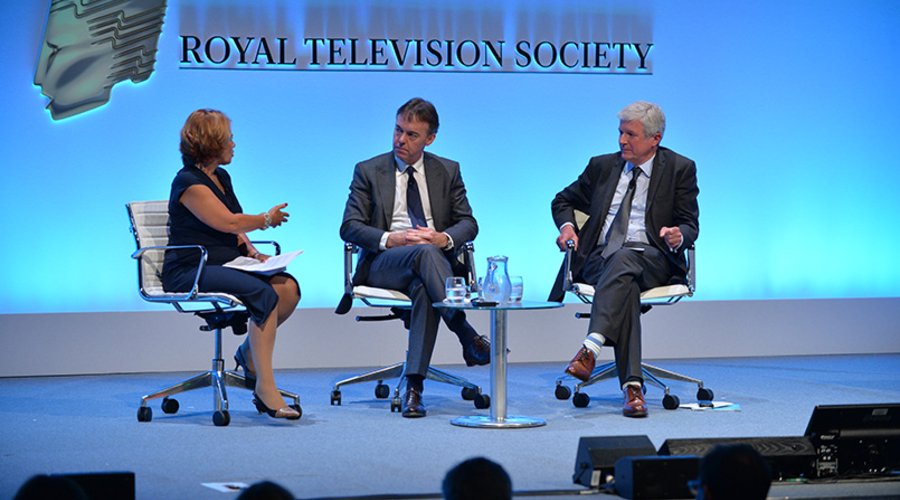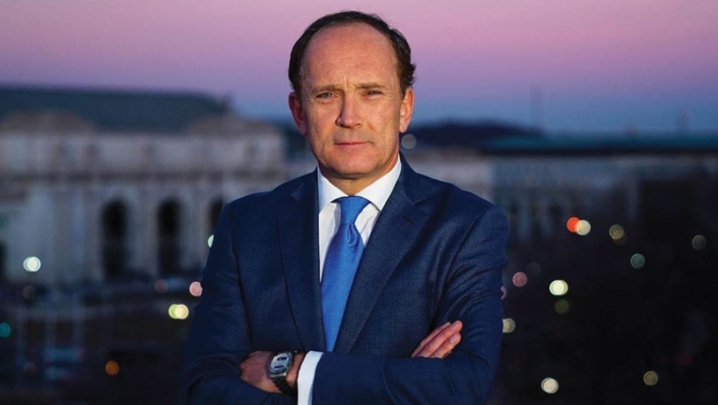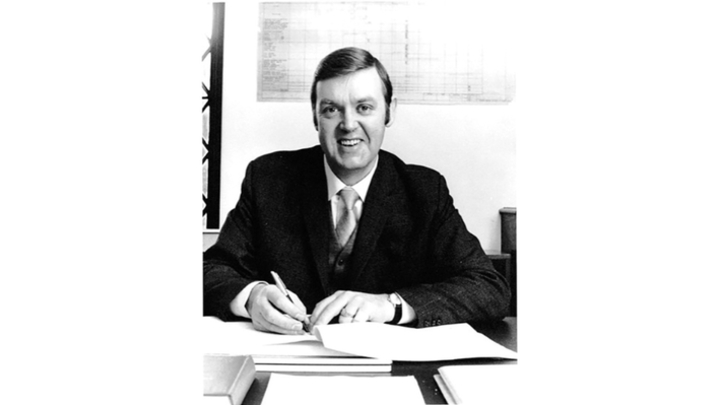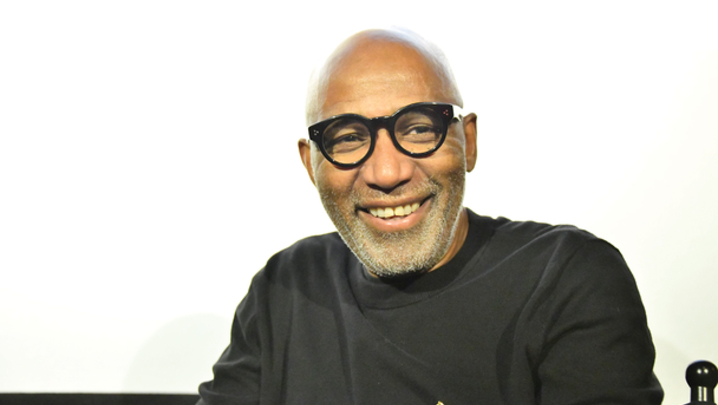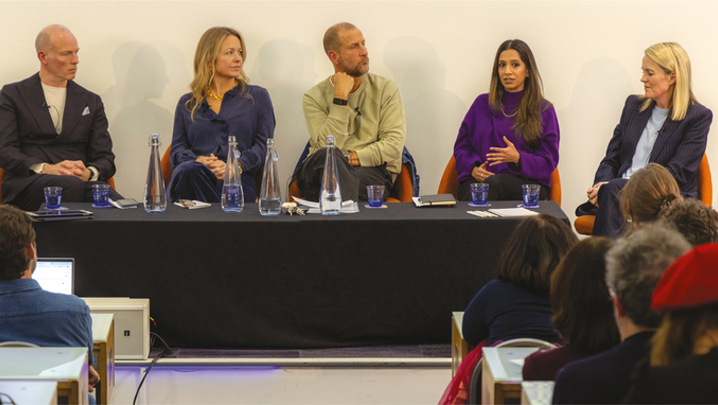Jeremy Darroch and Tony Hall find common ground in promoting ways to nurture the next generation of TV professionals
The final session of the day brought to the stage two of the biggest players in British television to discuss how to recruit the best people to the sector.
BSkyB Chief Executive Jeremy Darroch and BBC Director-General Tony Hall buried their differences during a friendly discussion and reached agreement on the importance of nurturing the next generation of TV talent.
Lorraine Heggessey, former chief of TalkbackThames and ex-BBC One controller, who chaired the session "Enabling the Next Generation", outlined the challenge TV faces: "Technology is rapidly changing our business. Consumers want their programming on the go – they want it whenever, wherever – and we are now competing for the brightest and the best [with companies] in the technological field."
"[We have to bring] the right talent into Sky and create an environment and culture for them to thrive," said Darroch. "This is right at the top of my personal agenda and it has to be led from the top because, unless it is, it's never going to course through the business."
Hall emphasised the importance of searching more broadly for new recruits. "I'm very keen to open up the BBC to wherever the talent might be. It's all very well if you have parents who have deep pockets or parents with connections or you go to the right Oxbridge or Russell Group university, but as I go around the BBC I'm struck by how talent comes in all different forms. It's up to us to stand up for equality of opportunity," he said.
Since returning to the BBC in April 2013 as Director-General, Hall has backed apprenticeships as a means of widening the recruitment net.
He committed the BBC to a 1% quota of its public-service workforce being made up of apprentices by the end of 2016 – in fact, this target has been met two years early. When he arrived, there were 37 apprentices employed at the BBC; now there are 180 and he said the number would rise still higher.
"Apprenticeships matter because it's paid employment, it's paid skills; it's actually finding people from all sorts of backgrounds to come and work at our organisation," Hall explained.
Darroch said that some businesses narrowed their recruitment to elite universities, which meant that they "self-select their talent pool". He added: "I reject that [approach]. We need to be broad and sweep the corners and we'll get much richer, more diverse talent. Everything I've learned over the years is that you will then build a better, more innovative organisation."
 Heggessey asked if moving to "university-blind applications" (that is, removing the name of the university the applicant attended from their application) would help broaden recruitment.
Heggessey asked if moving to "university-blind applications" (that is, removing the name of the university the applicant attended from their application) would help broaden recruitment.
Describing this suggestion as an "over-engineered idea", Darroch added: "It's just not that complicated – you've got to decide what you want to do and then create the culture in the organisation to go and do that."
One recent initiative Darroch was keen to discuss was Sky Skills Studios, a small studio built by the broadcaster at its Osterley HQ that introduces 12,000 schoolchildren every year to making television.
The scheme is open to students from eight to 18, who have the opportunity to work with the latest technology, including cameras, green screen and editing tools. "They create their own news report, linked to the curriculum, on a topic such as cyber-bullying," explained Darroch. "Hopefully, they leave with a much better impression of [what it takes to] create media."
"There are also some really important benefits for us," he continued. "What do we know about kids? They all start talking to their friends and families and we get little advocates for Sky – and who knows where that will lead?
"We'll have to find out in 10 years' time whether they feel motivated and open to join an organisation like Sky. I think that will be the case."
Darroch revealed that Sky plans to add more skills studios around the country, enabling up to 50,000 students a year to learn about TV.
Jeremy Darroch and Tony Hall (right) both agreed that investing in the next generation is of vital importance (Credit: Richard Kendal)
Turning to how broadcasters can compete for the best talent with tech giants such as Facebook and Apple, Heggessey said: "[Google chief] Eric Schmidt talked at Edinburgh a couple of years ago about a skills deficit in the UK, saying we teach our kids in school how to use software but not how to make it. Are you finding there is a skills gap?"
"Young people should all understand coding and understand the importance of it. I think this is being addressed now in terms of changes to the curriculum," replied Hall.
"I think that if you wait for the system to change [in regard to coding], it'll be too slow, so you've got to do more yourself," said Darroch. "Sky has its own software company now, with around 125 young people who have joined directly from school."
The Sky chief added that these recruits have stayed with the broadcaster: "Two or three years into this programme, our level of attrition is very small."
Widening the discussion, Hall said that he wanted the BBC to be "bold and original" in its programmes. To achieve this, he added, "you have to have a culture where people feel that they can fail. They can learn from that failure and then we all learn and move on. [We don't want a culture where] you make a mistake and so heads must roll or, in the [case of the] BBC, junior heads must roll. You want to be in a culture that is invigorating, exciting and supportive."
Wrapping up the discussion, Heggessey asked the two chiefs whether their broadcasting organisations were "competing against each other" for talent.
"We compete in lots of areas – that's the nature of big business," replied Darroch. "But in areas such as talent development, we have to recognise that we are two of the biggest organisations and, therefore, if a lot of what we can do can course through the industry, then that's a good thing."
Session Eleven, "Enabling the Next Generation", was produced by Liam Hamilton and chaired by Lorraine Heggessey. The panellists were BSkyB Chief Executive Jeremy Darroch and BBC Director-General Tony Hall.
Question & answer
Tony Hall on... decriminalisation
Q Lorraine Heggessey: Do you support decriminalising licence-fee evasion?
A Tony Hall: It's really good that we're going to get data on how many cases [and] how long they take... The question is how can we ensure that we don't lose the money without people going to jail... That's part of the Charter [renewal] process – because it's roughly £35m for every 1% of people who evade the licence fee.
Q Lorraine Heggessey: Do you believe people should go to jail for not paying?
A Tony Hall: No, of course I don't. But... our evasion rate is 5.3%-5.4%; for utilities it's 10%. We've got to work this through.
Jeremy Darroch on... retransmission fees
Q Lorraine Heggessey: Both ITV and Channel 4 have called for Sky [and Virgin] to pay a fee to air their channels. Earlier today, Culture Secretary Sajid Javid said he would examine whether a "free market" approach to fees should be adopted in the UK.
A Jeremy Darroch: I'm really supportive of deregulation... and I think it's really encouraging that the Secretary of State recognises that this is a complex issue.
For deregulation to work, it needs to work both ways and look at the entirety of the problem, not just [allow] the commercial public service broadcasters to look across the pond [to the US, where free-to-air broadcasters receive fees from cable operators] and cherry pick bits and pieces of an entirely different system. [We also need to took at]... EPG prominence, which is an incredibly valuable benefit.
Is the BBC too big?
Q Henry Mance, FT: Jeremy, do you think the British broadcasting industry would be more vibrant if the BBC was smaller?"
A Jeremy Darroch: I think it's pretty vibrant today. One of the great things about the sector we're in is that there's huge investment and innovation...
Where we disagree with the BBC is where they [enter] commercial areas – that's pretty well known. The big [challenge] is... [for] the commercial broadcasters, pay or otherwise, to serve the market more broadly. The big opportunity here is to grow the pie – still only 50% of people in the UK choose to pay for some form of TV.
How will the BBC and the BBC Trust fit together?
Q Jane Martinson, Head of Media, The Guardian: Rona Fairhead at the select committee [this morning] was very clear about her role and said that you, Tony, will be the face of the BBC and she will be the face of the Trust.
How do you see that relationship working until Charter review? She also said that the Lonely Planet deal [BBC Worldwide bought and then sold – at a loss – the travel-guide business] was a bad thing. Do you see any ambitions, in terms of global growth of the BBC, being curtailed by the new Trust Chair?
A Tony Hall: We've had quite a long conversation... and we saw eye to eye on many things. She brings from Pearson a huge amount of experience on how we can grow BBC Worldwide.
I'm clear about a number of things: we have to demonstrate the efficiency of the BBC... and that we're using the licence fee properly before the Charter process begins...
Equally, under the great leadership of Tim Davie, we've also got to show that we are making as much as we can to contribute towards the licence fee from BBC Worldwide.
BBC Worldwide
Q Lorraine Heggessey: What's your view on BBC Worldwide and what they should and shouldn't be doing?
A Jeremy Darroch: The BBC needs to be conscious of, and careful, when they butt up against the commercial sector – and particularly small organisations in the commercial sector.

